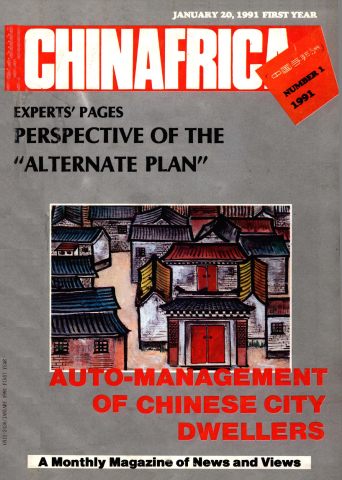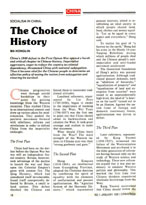China’s 1840 defeat in the First Opium War opened a harsh and critical chapter in Chinese history. Imperialist aggressors, eager to reduce the country to colonial dependency, threatened China with national subjugation. Thus it became vital for the Chinese people to determine an effective policy of saving the nation from subjugation and ensuring its survival.
Chinese progressives went through untold hardships in their quest for gaining knowledge from the Western countries. They studied China in an international context and drew up various plans for modernization. They pushed the patriotic movement forward with rebellions, reforms and revolutions in order to defend China from the imperialist onslaught.
The First Plan
China had been on the decline before the Opium War but was still an independent feudal country. Britain, however, took advantage of the decline to launch the war and blast open the Celestial Empire’s gates with cannon fire. The Qing Dynasty, which had considered itself invulnerable, found itself unexpectedly defeated by Britain, a small island nation. This defeat shocked the Chinese and forced them to reconsider traditional attitudes.
Landlord reformers, represented by Lin Zexu (1785-1850), began to awake to the importance of learning from the West. Wei Yuan (1794-1857) was the first one to point out that China should admit its backwardness and emulate the West. It took great courage and realism to make that statement.
What should China learn from the West? The main strength of the Western nations in Chinese eyes was their “strong gunboats and guns.”
The Second Plan
Hong Xiuquan (1814-1864), an intellectual from Guangdong Province, adapted the Christian doctrine by combining the spirit of equality with the elements of confucianism and peasant egalitarianism. His “Agrarian System of the Heavenly Dynasty,” which represented peasant interests, aimed at establishing an ideal society in which people shared land, food, clothes and money equally. “Let us be equal in every aspect and everywhere,” Hong said.
To realize his goal of “a heaven on the earth,” Hong led his army in the bloody 14-year Taiping Rebellion, during which millions of people died and the Chinese people’s antiimperialist and anti-feudal movement accelerated.
The theoretical foundation of Hong’s policy was peasant egalitarianism. Although traditional peasant demands, such as “abolition of hierarchy,” “equalization of property” and “equalization of land and exemption from taxation” were raised to an unprecedentedly high level, the ideal of “a heaven on the earth” turned out to be an illusion. Against the united front of foreign and domestic reactionary forces, egalitarianism was driven to defeat.
The Third Plan
Later reformers, represented by Kang Youwei( 1858-1927), witnessed the failure of the Westernization Movement and attributed it to the older generation of reformers having focused only on the study of Western science and technology. These new reformers argued that it was also necessary to emulate Western politics and philosophy. This marked the first time that Chinese thinkers considered wholesale borrowings from the West.
Kang Youwei maintained that China should follow the example of Tsar Peter I by reforming the country through the use of the monarch’s power, and also the example of Japan’s Meiji Restoration by setting up a congress and constitution, adopting a system of checks and balances and eventually establishing a constitutional monarchy and capitalism.
During the 100-Day Reform, Kang Youwei implemented his political ideas by creating administrative offices and suggesting the establishment of 12 bureaus: justice, taxation, education, agriculture and commerce, industry, mines, railways, post, mint, tourism, society and defence. The proposition was the core of the Constitutional Reform and Modernization (1898) as well as the boldest attempt to learn from the West. He hoped that feudal autocracy would be replaced with the help of the emperor’s power.
But the reformers’ demand for participating in the division of state power conflicted with the interests of feudal die-hards. Empress Dowager Ci Xi carried out a bloody suppression of the reform.
The failure of the Constitutional Reform and Modernization Movement indicated that, due to prevailing historical conditions, any effort to establish capitalism in China through reform was doomed to fail.
The Fourth Plan
The suppression of the reformers shocked patriotic intellectuals into a deeper understanding of the situation. It was becoming obvious that the ideal of saving China through capitalism was impractical unless the Qing Dynasty was overthrown by force.
Sun Yat-sen (1866-1925)founded the Revolutionary League, China’s first party of the national bourgeoisie, in Tokyo in August 1905. Its guiding political principles were to establish a republic and equalize land ownership.
A series of armed insurrections took place, ending in the Revolution of 1911, which finally overthrew the Qing Dynasty. After Sun Yat-sen’s inauguration as provisional presidency in Nanjing, he proclaimed the Provisional Constitution of the Republic of China and promulgated a series of decrees to protect and promote national capitalist industry and business.
Examining the provisional government’s internal structure and decrees, it is possible to see everywhere a projection of the United States. The Chinese bourgeoisie were hopeful that the time had arrived for the “Chinese industrial revolution.” Unfortunately, business was strictly regulated and capitalist development hindered by strong domestic feudal forces.
Moreover, the Western powers, which had built up their own capitalist systems much earlier, would not tolerate weak and backward countries enjoying similar development. While the Chinese “pupils” were eager to take the capitalist road, the Western “teachers” would not permit the establishment in China of a capitalist society. Instead, China was forced to remain in a semi-colonial and semi-feudal status.
Imperialists moved warships into the Changjiang(Yangtze) River, putting military pressure on the revolutionary government. They also plundered China’s income by enforcing economic sanctions against the revolutionary government. They used Yuan Shikai, who wanted to restore imperial authority with himself as emperor, to seize the fruit of revolution and brought China under the dark control of warlords. Powerful Japanese imperialist then forced its way into China. In On New Democracy, Mao Zedong summarized the history of modern China as being one of imperialist aggression, imperialist opposition to China’s development of capitalism. The ultimate defeat of the Revolution of 1911 proved again that the adoption of capitalism in China was possible.
Reviewing the evolution of proposals to revive China, we see that they improved steadily. New plans emerged as the old ideas failed one after another. This proves that the Chinese nation never yields to foreign pressure, and that the history of modern China is a history of patriotic struggle for liberation.
Only Successful Plan
In 1927, when China was in the depth of despair and uncertain about what direction to take, news came of the October Revolution in Russia. The Chinese people took renewed hope from the Russian people’s triumph over tsarist serfdom.
To advocate socialism became the strongest desire of the times. Historical experience showed that the only correct way to save China was to establish a republic of people’s democratic dictatorship and then advance towards socialism, by means of a thorough anti-imperialist, anti-feudal and new-democratic revolution.
Experience had since demonstrated that socialism not only liberated China from the domination of imperialists and reactionaries, but also enabled China to achieve great progress in industry, agriculture, science and technology, culture, education and national defence in just 40 years. China has become a strong, independent country that imperialists can no longer despise or oppress.
In brief, the conclusion that only socialism can save China is the inevitable result of the evolution of modern China’s attempts to achieve national salvation.

The Red Army trudging on snow covered mountains during the 1935 Long March. XINHUA


 Copy Reference
Copy Reference 